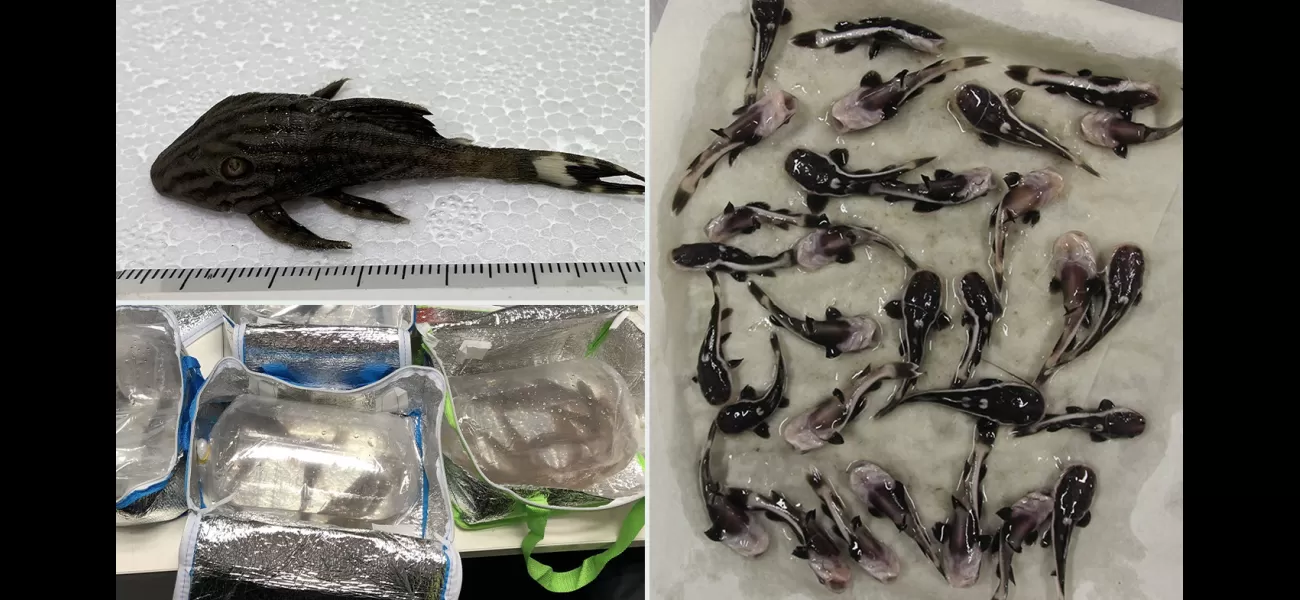Two people fined for illegally bringing 240 live fish into Melbourne Airport.
During an inspection at Melbourne Airport, a biosecurity officer discovered 120 live fish in a bag of water.
April 27th 2024.

Two individuals have been slammed with a significant fine after attempting to sneak 240 live fish through Melbourne's airport, not once, but twice. It all started when a sharp-eyed biosecurity officer discovered a bag containing 120 live fish in water during a routine baggage inspection at Melbourne International Airport on December 29, 2019. Surprisingly, the fish had not been declared on the passenger's incoming card, leading to an immediate $420 infringement notice.
But the story doesn't end there. Just one month later, the same passenger and their business partner were once again caught at Melbourne International Airport, this time with an additional 122 undeclared live fish in their possession. As a result, an investigation was launched to uncover the truth behind these repeated attempts, which ultimately led to a civil penalty proceeding.
In a court hearing on April 19, the first traveller was slapped with a staggering $37,000 fine, while their business partner received a $17,000 fine for their involvement. These are the first civil penalties to be issued under the Biosecurity Act 2015, a clear indication that the government is taking the nation's biosecurity as a top priority.
Minister for Agriculture, Fisheries and Forestry Senator Murray Watt emphasized the seriousness of the situation, stating, "Every day, our biosecurity officers work tirelessly to keep potential threats out of our country, and it is crucial that the government, industry, and the wider community support their efforts." He went on to explain the dangers posed by the illegal importation of live fish, as some of the species attempted to be smuggled into Australia are considered pests and can pose a significant risk to human, animal, and plant health.
Moreover, the Minister highlighted the detrimental impact that illegally imported live fish can have on our environment and economy, including the potential spread of diseases and threatening native species. He also reminded travellers of the severe consequences that come with breaking Australia's biosecurity laws, as civil penalty proceedings can be brought against anyone who violates them.
In conclusion, this case serves as a reminder of the importance of complying with biosecurity laws and regulations to protect our country's delicate ecosystem. Let us all do our part in supporting our biosecurity officers and ensuring the safety and well-being of Australia.
But the story doesn't end there. Just one month later, the same passenger and their business partner were once again caught at Melbourne International Airport, this time with an additional 122 undeclared live fish in their possession. As a result, an investigation was launched to uncover the truth behind these repeated attempts, which ultimately led to a civil penalty proceeding.
In a court hearing on April 19, the first traveller was slapped with a staggering $37,000 fine, while their business partner received a $17,000 fine for their involvement. These are the first civil penalties to be issued under the Biosecurity Act 2015, a clear indication that the government is taking the nation's biosecurity as a top priority.
Minister for Agriculture, Fisheries and Forestry Senator Murray Watt emphasized the seriousness of the situation, stating, "Every day, our biosecurity officers work tirelessly to keep potential threats out of our country, and it is crucial that the government, industry, and the wider community support their efforts." He went on to explain the dangers posed by the illegal importation of live fish, as some of the species attempted to be smuggled into Australia are considered pests and can pose a significant risk to human, animal, and plant health.
Moreover, the Minister highlighted the detrimental impact that illegally imported live fish can have on our environment and economy, including the potential spread of diseases and threatening native species. He also reminded travellers of the severe consequences that come with breaking Australia's biosecurity laws, as civil penalty proceedings can be brought against anyone who violates them.
In conclusion, this case serves as a reminder of the importance of complying with biosecurity laws and regulations to protect our country's delicate ecosystem. Let us all do our part in supporting our biosecurity officers and ensuring the safety and well-being of Australia.
[This article has been trending online recently and has been generated with AI. Your feed is customized.]
[Generative AI is experimental.]
0
0
Submit Comment





